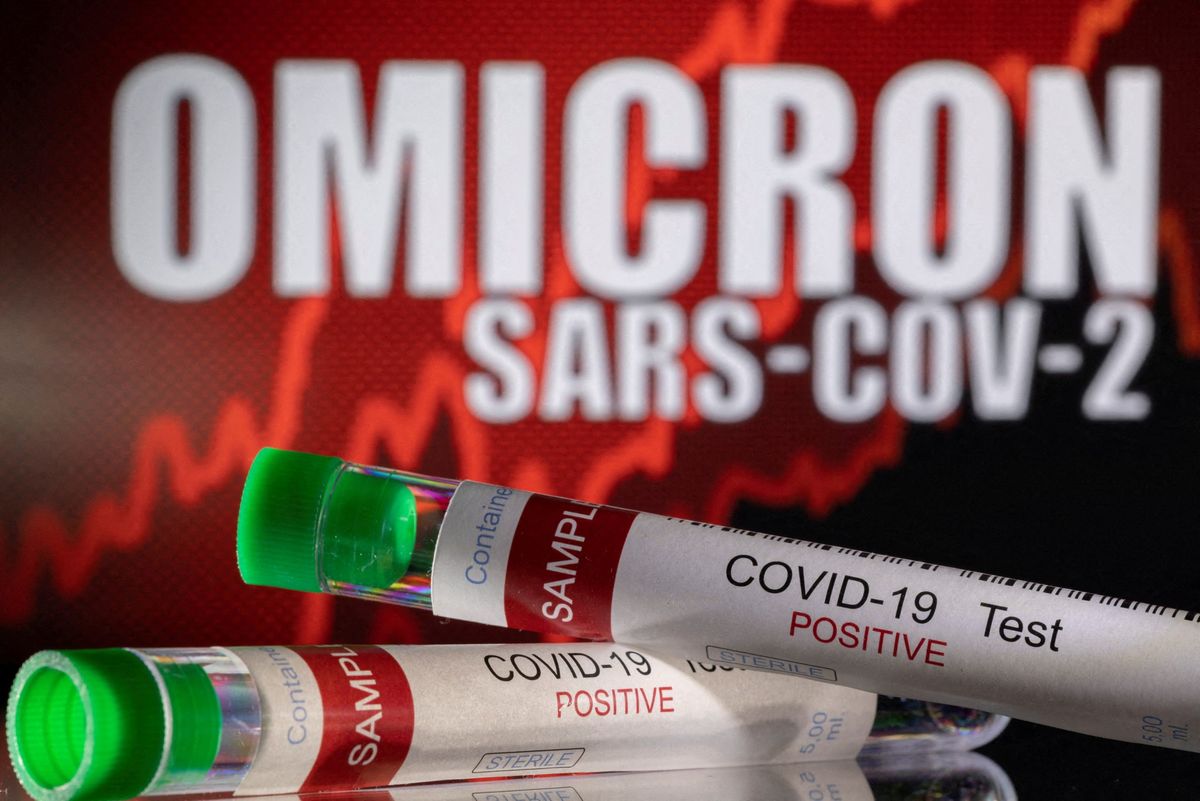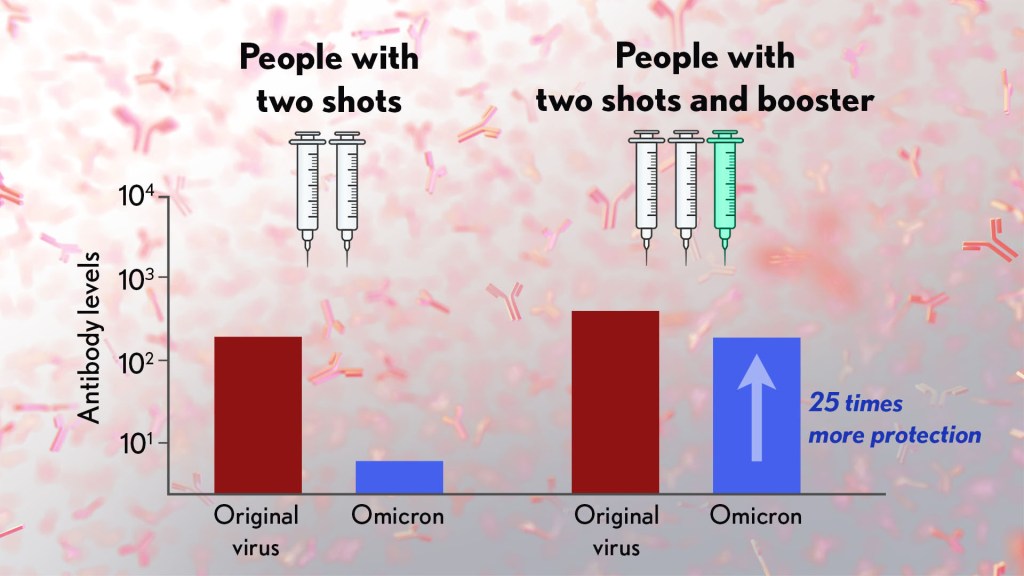Here’s what you need to know about the omicron variant

A few minutes every morning is all you need.
Stay up to date on the world's Headlines and Human Stories. It's fun, it's factual, it's fluff-free.
“Omicron is spreading at a rate we have not seen with any previous variant," said WHO Director-General Tedros Adhanom Ghebreyesus during a news briefing. “The reality is that omicron is probably in most countries, even if it hasn’t been detected yet."
What are variants?
- The omicron variant is a variant of the original SARS-CoV-2 virus, which we know as the coronavirus or COVID-19.
- Experts say that new variants appear each day, but they aren’t really a problem unless the new variants give the virus some sort of advantage (which is a disadvantage for us fighting it).
- Omicron, which was first reported in South Africa, is the latest variant labeled by the World Health Organization (WHO) as a “variant of concern.”
- Viruses are constantly changing through mutations, and sometimes these mutations change the virus in its composition and structure.
- This results in new variants being created, and it can be a huge problem considering the virus, through mutations, can adapt to overcome the vaccines that have already been developed.
- Since the virus has been discovered, scientists have already made some discoveries about the variant, but since it’s still early days, we’re still being told to wait and see before drawing conclusions.
What new updates do we have on omicron?
- One of the biggest concerns that scientists and experts have about omicron, which is now present in over 75 countries, is the number of mutations that it has accumulated.
- Dr. Francis Collins, the director of the National Institutes of Health, noted that the omicron has, so far, accumulated over 50 mutations.
- But the bigger concern is that these mutations include about 30 changes in the spike protein, the part of the coronavirus that mRNA vaccines teach our immune systems to attack.
- This means the part of the virus that the vaccine is supposed to detect and be effective against may now not be as responsive to the vaccine.
- But Dr. Collins also noted that this doesn’t mean that the current vaccines are completely ineffective against the omicron variant.
Are there any other concerns?
- Well, when omicron was first spotted in South Africa, South African scientists said that the new variant seemed more transmissible but less likely to cause severe disease.
- When these findings were shared, though, officials like Dr. Anthony Fauci – the leading expert on infectious disease in the United States, said to wait and see because it was still too early to make any concrete judgments.
- But now, researchers at the University of Hong Kong have said that they’ve also found similar results. More specifically, omicron infects about 70 times faster than delta and the original strain, though the severity of illness is much lower.
- The study is now under peer review.
- “By infecting many more people, a very infectious virus may cause more severe disease and death even though the virus itself may be less pathogenic,” said Michael Chan Chi-wai, the study’s lead author, in a statement. But because omicron can partially escape immunity from vaccines and past infection, “the overall threat from omicron variant is likely to be very significant.”
How effective are the current vaccines against the omicron variant?
- NHS’s blog post explained that while the standard two shots should prove effective in providing antibodies against the original virus, there appears to be a decline in antibodies present that can actively fight off the omicron variant.
- The data also showed that a third shot, also called a booster shot, can significantly increase those antibodies.
- “Though these data are preliminary, they suggest that getting a booster will help protect people already vaccinated from breakthrough or possible severe infections with Omicron during the winter months,” writes Dr. Collins.

- According to Dr. Collins, people who have the two shots along with a booster have 25 more times the protection against the omicron variant than those with just the two shots.
- Another piece of good news is that the omicron variant reportedly operates similarly to the original variant meaning the same methods of combat should be effective.
- “In lab studies working with live Omicron virus, the researchers showed that this variant still relies on the ACE2 receptor to infect human lung cells,” writes Dr. Collins. “That’s really good news. It means that the therapeutic tools already developed, including vaccines, should generally remain useful for combating this new variant.”
What do experts suggest?
- The biggest concern for many health experts is the increased transmissability of the omicron variant, with some even saying that it would probably be best to cancel or alter holiday plans.
- Bronwyn MacInnis, the director of pathogen genomic surveillance at Harvard University, said that her holiday plans were changing and recommended others to do something similar.
- “Personally, I’m reevaluating plans for the holidays," she said on a call with reporters Tuesday. “It’s the responsible thing to do and what feels right given the risk."
- Dr. Jacob Lemieux, an infectious disease expert at Massachusetts General Hospital, also pointed out that the omicron variant has been moving “faster even than the most pessimistic among us thought that it was going to move." He went on to say, “There’s a high likelihood that it will come to your holiday gathering."
What’s next?
- All the data currently suggests that a third shot is probably best, especially for those planning any holiday travel plans.
- Still, given the severity in which the virus is spreading, there is a chance that there could be another wave of outbreaks in the coming weeks, with several countries such as South Africa and the United Kingdom already seeing huge case number spikes.
- For example, on Wednesday, the UK reported around 79,000 cases in 24 hours with Prime Minister Boris Johnson saying that omicron would become the dominant strain this month earlier this week.
- On the other hand, South Africa is now seeing the fourth wave of outbreaks. On Wednesday, the country reported 26,976 new cases in the past 24 hours, marking the highest number of cases the country has ever seen.
- “Omicron is spreading at a rate we have not seen with any previous variant," said WHO Director-General Tedros Adhanom Ghebreyesus during a news briefing. “The reality is that omicron is probably in most countries, even if it hasn’t been detected yet."
You drive the stories at TMS. DM us which headline you want us to explain, or email us.




Comments ()